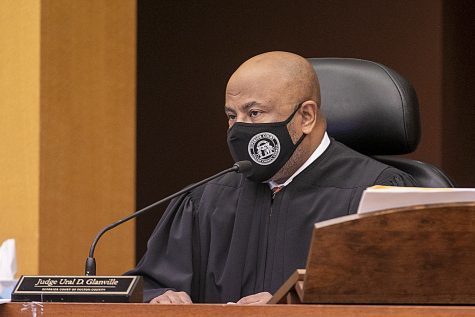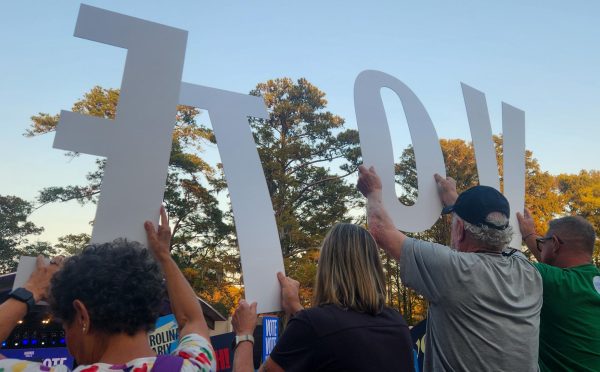Criminal Justice Reform Bill looks to hold those in law enforcement accountable
For those victims of police violence, Senate Bill 300 seems to be the light at the end of a tunnel. Finally, action is backing words, and seems to herald a new age in which law enforcement officers will be held to a higher standard, and more importantly, will be held accountable for their actions. While many in the police force aim to protect the American people at any cost, for those that go overboard and begin resorting to violence, it could be their new reckoning.
After it passed the state Senate with a vote of 100-2, Gov. Roy Cooper signed this bill, referred to as the Criminal Justice Reform Bill, into law on Sept. 2. The bill, sponsored by New Hanover County’s Sen. Michael Lee, aims to hold those in law enforcement more accountable. Essentially, if a worker in law enforcement has breached the standards of their job, this law raises the penalties for their actions. The protests and uptick in awareness after George Floyd’s death in recent years most likely led to the initial filing of this bill, and the multiple parts it contains certainly attempt to close the gap between wrongdoings and tangible penalties.
The first section in the bill highlights the sharing of knowledge between those higher up in law enforcement. It is now mandatory to place critical incident information in a database that includes information on all law enforcement officers involved in incidents. An incident is roughly defined as a case in which there is a lack of situational control, with emphasis placed on incidents including use of force. Critical incident information includes circumstances, officers, dates and times, officers that applied force, location, reason for initial contact (traffic violation, ambush, routine patrol), type of force used, injuries, and whether or not the subject resisted, among other things. This makes sure that law enforcement officers will have a mark on their record if they have broken the standards of their job, and makes it easy to look up the past violations an officer might have when hiring them. In the past, after an altercation occurred, this information was not required to be recorded in a database and if they were fired, they may have been able to be hired in another location without any knowledge of their past.

One of the bill’s main components are the reforms it will make to the way officers deal with deescalating a scene and handling violent altercations. The bill requires officers to take crisis intervention training before entry level employment, with all standards written by the North Carolina Sheriffs’ Education and Training Standards Commission, which has the power to form and adopt its own rules of procedure. Mental health screenings are also required, which allows employers to determine which officers may not be fit for high-intensity situations, and must be performed by a licensed psychologist, psychiatrist, or other professional in the field of mental health. This not only sets baseline requirements that must be met for employment, it attempts to stop those that might worsen violent altercations and create issues with the public, or within the police force. Mental health screenings in the past have only taken out 5% of those entering the police force, and this bill suggests that is a precaution that must be taken.
Training during employment is also a pillar in the bill, stating that training is required in ethics, mental health, community interaction, implicit bias, racial equity and use of force. Officers will also be required to intervene during the unlawful or unethical incidents involving their fellow employees and report the occurrence within 30 days. Each law enforcement entity will be responsible for meeting these requirements and enforcing these standards within their ranks.
Another large point made in the bill pertains to the use of force, and the amount of information that is gathered after a forceful incident. Providing all information on the incident to the Department of Justice is mandatory. With this, data may also become more representative of reality, and improve reports such as The National Data Collection on Police Use of Force.
Overall, the bill lays out a large array of standards that may reduce the amount of violent altercations between the public and those in law enforcement. It definitely is a large step towards protecting the public from potential problems that might arise with those tasked with protecting them, however this does not ensure total safety.

The bill creates a new duty to intervene, but in practice this may be a lot harder to enforce. How will we know that officers will really intervene? How will we know interpersonal relationships within departments won’t hinder enforcement of the law? It is well known that cops protect cops, so how will we know that those simply trying to do their job are not enabling those willing to go to any lengths to assert their power? How will past incidents affect the judgement of officers, especially regarding use of force, and how will this be approached? These issues reach far deeper than on paper, and when laws translate into real life, change can be difficult.
Altercations are inevitable, and will not be solved with one bill, no matter how many statements are set into law. Humans react to situations in unpredictable ways at times, and there’s no definitive way to extricate every law enforcement officer who will become violent with a citizen. Accountability that cannot be attained within an organization must be enforced from outside, which is what this bill takes a step towards.
This bill may even serve racial minorities partially, since these populations are the most likely to be caught in violent altercations with police officers. Officers may not be protected as much, even within a system which has often protected its own. However, this bill does not seem to punish law enforcement officers at every small issue, but simply put in place a law that would hold them accountable, and make sure that those outside the police force are made aware of situations they previously would not know about. SB 300 allows situations where a death or use of force has occurred to have heightened standards.
Some social justice activists have criticized the bill, saying the bill will not do enough to prevent systemic racism within policing.
“The law enforcement training and oversight provisions in SB 300 rely on and perpetuate the falsehoods that the failings of the criminal legal system are the result of ‘a few bad apples’ and that the police can police themselves,” said Daniel Bowes. His statements mirror criticisms from other advocates.
“One law alone can’t improve every part of our criminal justice system, but this law will make our state safer and more just,” said Josh Stein, an attorney in a statement. He then goes on to thank the senators sponsoring the bill, and acknowledges the governor’s Task Force for Racial Equity in Criminal Justice, which is co-chaired by himself and Justice Anita Earls. His words seem hopeful, and his voice is backed by many others and more importantly, action.












Katie Brady • Sep 13, 2021 at 12:26 pm
We need police to protect us, not kill us. Any attempt to police the police is welcome in my book. Keep up the good work. NO ONE is above the law.